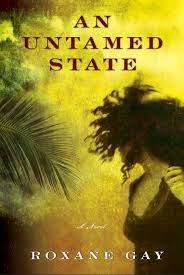
First things first… I don’t know how to write a book review. I’ve never written one before, and I wasn’t supposed to write this one. I had found a blurb for Roxane Gay’s debut novel, An Untamed State, in The Chicago Tribune. I recognized Ms. Gay’s name from Smile Politely’s coverage of the Pygmalion Lit Fest, and thought I might suggest the title to one of SP’s other writers for a review.
Then I started actually reading it.
I think I knew about a third of the way in that I didn’t want to hand this book over to anybody else. Not that I didn’t want someone else to read it. Quite the opposite. I want as many people as possible to read this book.
So why should I—with my complete lack of experience at this sort of thing—be the one to write about it? Selfishly, I wanted the chance to sort out my experience of the book. What reading it meant to me. Did to me.
I remarked to a friend recently that I felt very fortunate in that, over the last few months, I’ve read more truly good books than I had in a long time. Entertaining books, clever books, all deftly plotted and engrossing to one extent or another. And then I sat down one Saturday afternoon with a fresh cup of coffee and started to read An Untamed State.
I put a lot of stock in opening lines. Not just first sentences, but the opening lines of a book. The way they introduce you to the world you’re about to visit. On the first page of An Untamed State, in the first vertical inch-and-a-quarter of space, the door swings open thusly:
“Once upon a time, in a far-off land, I was kidnapped by a gang of fearless yet terrified young men with so much impossible hope beating inside their bodies it burned their very skin and strengthened their will right through their bones.
They held me captive for thirteen days.
They wanted to break me.
It was not personal.
I was not broken.
This is what I tell myself.”
Over the next four-and-a-half-pages, otherwise known as Chapter 1, Roxane Gay introduces Mireille Duval Jameson and her husband, Michael, in such a way that, as I read it, my heart seemed to expand with care even as it slammed into my chest. By the end of the first brief chapter, I wasn’t just intrigued—I was invested.
My coffee went cold, untouched and forgotten.
 On a beautiful day, just seconds after leaving her father’s gated estate in Haiti, Mireille is taken from her family by force. Over the next thirteen days, while her well-off and fiercely proud father refuses to give in to the kidnappers’ demands and her American husband watches impotently from the sidelines, Mireille is subjected to one cruel indignity after another. When an agreement—a ransom—is finally negotiated, she is released; but she is not the same. In less than two weeks she has become someone else. She has become a stranger to herself, a woman who is neither her husband’s wife nor her father’s daughter nor her son’s mother. She becomes who she needs to be to withstand the evil of these men.
On a beautiful day, just seconds after leaving her father’s gated estate in Haiti, Mireille is taken from her family by force. Over the next thirteen days, while her well-off and fiercely proud father refuses to give in to the kidnappers’ demands and her American husband watches impotently from the sidelines, Mireille is subjected to one cruel indignity after another. When an agreement—a ransom—is finally negotiated, she is released; but she is not the same. In less than two weeks she has become someone else. She has become a stranger to herself, a woman who is neither her husband’s wife nor her father’s daughter nor her son’s mother. She becomes who she needs to be to withstand the evil of these men.
She becomes, as Gay writes, No one.
There are moments in the book that are excruciating, if not for their graphic content, then for their emotional resonance. There’s more than one way to leave a reader breathless, after all, and Ms. Gay has a talent for squeezing the air out of a reader with both savagery and poignancy. As Mireille loses her sense of self to her captivity, the book is intercut with “the before,” in which she meets and gradually comes to love Michael. As her degradation at the hands of her captors goes on, we are shunted from her cell in Haiti to the first blush of love, to the ecstasies and frustrations of an adult relationship, to the delivery and love of a son.
Mireille is not, by her own admission, always an easy person to love. She is emotionally distant, mistrusting, and quick to temper. She is also fascinating and intelligent, and capable of powerful, consuming love.
 The relationship that Gay (pictured, left) creates between Mireille and Michael is one of the most genuine depictions of love that I have ever read. It is neither saccharine nor simple, and neither are either of them. There is an honesty to their feelings (and feelings about each other) that I have seldom encountered. And the fact that I’ve just diverted from the horrors that Mireille endures to talk about their courtship and marriage is an indication of how compelling their love is, and how jarring it is to be forced out of the before and back into the dark place where Mireille is No one. This is what it’s like to read An Untamed State: It’s a gut-check for your heart, a serious case of emotional vertigo.
The relationship that Gay (pictured, left) creates between Mireille and Michael is one of the most genuine depictions of love that I have ever read. It is neither saccharine nor simple, and neither are either of them. There is an honesty to their feelings (and feelings about each other) that I have seldom encountered. And the fact that I’ve just diverted from the horrors that Mireille endures to talk about their courtship and marriage is an indication of how compelling their love is, and how jarring it is to be forced out of the before and back into the dark place where Mireille is No one. This is what it’s like to read An Untamed State: It’s a gut-check for your heart, a serious case of emotional vertigo.
And it’s so beautifully crafted. Each word, each description so lovingly selected and aching with art and truth. This is a story of horrifying abuse that never becomes exploitative. It is a story of love and courage and survival that never becomes sappy or preachy or cliché. Mireille’s journey is harrowing and shot-through with such tenderness and self-examination (self-frustration, at times), that I cannot help but think that she is one of the richest protagonists I’ve found in print.
The other characters are similarly if not equally fascinating—Mireille’s parents and her in-laws, particularly. Their inner workings, the ways of their hearts and minds, hold depths that are a pleasure to discover in flashback and to follow in the after, uneasy as we are about Mireille’s next step toward (or away from) herself.
Of particular interest to me, as a male reader, is the way Michael’s attempts to understand and help Mireille (in the after) parallel the good intentions and inevitable shortcomings of men with regards to feminism. He wants to do the right thing, to say the right thing, to stand beside her and show support. He wants the things he might do or say to be enough. But her struggle is not his, and he can’t ever truly understand it. He can’t live the way she has. The way she has had to.
This is not a book for the faint of heart, and yet I truly think it should be read by as many people—women and men alike—as possible. It is enormously smart, it is funny in such unexpected and lovely ways, and it is the only book that has ever—in a lifetime of reading that includes an MA in Literature—ever brought me to tears.
Roxane Gay is a phenomenal writer who I suspect will continue to make readers’ hearts expand even as they slam away at their chests. On the inside jacket flap of her book, it states that “Flavorwire has already dubbed her one of 25 Women Poised to Lead the Culture.”
Goddamn I hope so.








